 Petzlover
Petzlover Chippiparai is originated from India but Petit Basset Griffon Vendeen is originated from France. Chippiparai may grow 23 cm / 10 inches higher than Petit Basset Griffon Vendeen. Both Chippiparai and Petit Basset Griffon Vendeen are of same weight. Both Chippiparai and Petit Basset Griffon Vendeen has almost same life span. Both Chippiparai and Petit Basset Griffon Vendeen has same litter size. Chippiparai requires Low Maintenance. But Petit Basset Griffon Vendeen requires Moderate Maintenance
Chippiparai is originated from India but Petit Basset Griffon Vendeen is originated from France. Chippiparai may grow 23 cm / 10 inches higher than Petit Basset Griffon Vendeen. Both Chippiparai and Petit Basset Griffon Vendeen are of same weight. Both Chippiparai and Petit Basset Griffon Vendeen has almost same life span. Both Chippiparai and Petit Basset Griffon Vendeen has same litter size. Chippiparai requires Low Maintenance. But Petit Basset Griffon Vendeen requires Moderate Maintenance
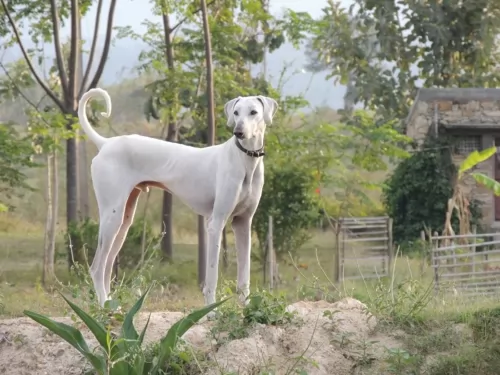 The Chippiparai is a working dog found in India and until recently there has been little interest in the purity of any breed, but rather only an emphasis on the abilities of the dog. They are only beginning to research the origin and history of their native dogs such as the Chippiparai. Not much is known about the origin of the breed except that it is found almost exclusively in Tamil Nadu and Keraia in the southern part of the subcontinent of India. Other than this there is much speculation about the breed’s origin but very little-known facts. It is indeed an ancient breed; however, its origin could be thousands of years ago or simply hundreds of years ago.
The Chippiparai is a working dog found in India and until recently there has been little interest in the purity of any breed, but rather only an emphasis on the abilities of the dog. They are only beginning to research the origin and history of their native dogs such as the Chippiparai. Not much is known about the origin of the breed except that it is found almost exclusively in Tamil Nadu and Keraia in the southern part of the subcontinent of India. Other than this there is much speculation about the breed’s origin but very little-known facts. It is indeed an ancient breed; however, its origin could be thousands of years ago or simply hundreds of years ago.
• Perhaps it is a descendant of the Saluki as it resembles this breed quite a bit. It has been believed for some time that the Saluki is the original sighthound and the source of all sighthound breeds. The Saluki was very popular in the Middle East, especially in Persia and Arabia from which it could easily have spread to India. It would then have been shared from Northern India to Southern India where the Chippiparai is found.
• Perhaps the Chippiparai is a descendent of sighthounds from Central Asia and Afghanistan – the Tazi, Taigan, Hortaya Borsaya or the Afghan Hound. This part of Central Asia had more trade, influence and contact with the Indian subcontinent early in their history than with any other region. The Chippiparai is considered by some to be more like these sighthounds than like the Saluki and the interaction between these regions has a much longer history than the Middle East and India.
• It is also speculated that the Chippiparai might have been developed completely and uniquely from the local street and working dogs. With the civilization of India being one of the oldest in the world, it is considered a possibility that the Chippiparai is the descendent of the Harappan hunting dogs that probably were developed by the Indus Valley or Harappa roiling class.
Wherever the Chippiparai came from, they were the exclusive property of the wealthy and ruling castes. These upper castes were the only ones that could legally hunt with dogs or afford to feed one. The royal classes of Tiruneivell, Thanjavur, and Madurai all fed the popularity of the breed among the upper castes. They were coursing dogs used to chase down the prey once it was sighted. The Chippiparai are incredibly fast runners and would catch almost any prey and either hold it or kill it for their hunter. The Chippiparai, when not hunting, had to be chained so they would not chase any small animal that they saw. This confinement also added to the purity of the breed as random breeding was prevented.
The southern part of the Indian subcontinent is extremely hot with routine temperatures over 100’. The Chippiparai was developed to withstand these extreme temperatures and is more heat tolerant than most any other breed. They also need very little food and are resistant to the many parasites and diseases found in southern India.
Harboring the belief that Indian dogs were not as good as European ones, the occupying countries of Portugal, France, and Britain, had no interest in the Chippiparai, again leaving the breed to develop naturally on their own with little or no interbreeding. They also received no formal recognition because Indian culture only valued the dog for its working abilities. There was no Indian Kennel Club until 1956.
The Chippiparai is now very rarely and only found in the area of its birth. Many believe the breed is in danger of becoming extinct and even though it is now registered with Indian Kennel Clubs it is not often shown in their dog shows. Lovers of the breed are now attempting to get Indians to recognize that the Chippiparai is a great companion animal and attempting to save the breed.
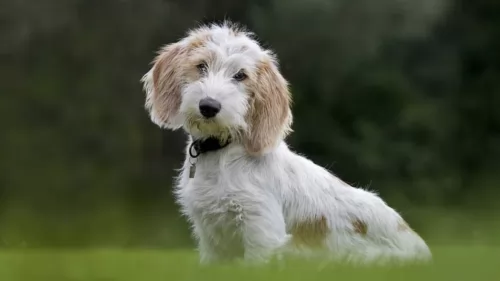 The Petit Basset Griffon Vendéen hails from France. They have always been used to hunt game by scent. This dog has always been appreciated for its independence and the fact that is is mentally focused and fit.
The Petit Basset Griffon Vendéen hails from France. They have always been used to hunt game by scent. This dog has always been appreciated for its independence and the fact that is is mentally focused and fit.
These dogs, referred to as the PBGV descend from the larger Griffon Vendeen, which comes in four distinct sizes. The first official French standard for this dog was published in 1898. It was in 1909 that a revised standard for the dog recognized two distinct varieties.
The first PBGVs were imported to the United States in 1983 and the Petit Basset Griffon Vendeen Club of America was founded in 1984.
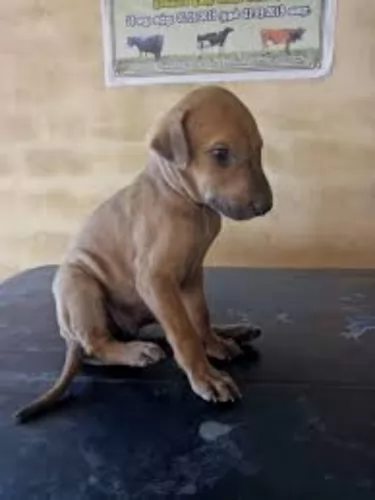 The Chippiparai is a typical sighthound although their size and appearance will vary more than that of registered purebred sighthounds. Typically, they will have a long, domed head with small erect ears and dark eyes. Their muzzle will be as deep and wide as the skull but longer. Their legs are straight and long, their chest is roached back and deep, giving them, an appearance very similar to a greyhound or other sighthound.
The Chippiparai is a typical sighthound although their size and appearance will vary more than that of registered purebred sighthounds. Typically, they will have a long, domed head with small erect ears and dark eyes. Their muzzle will be as deep and wide as the skull but longer. Their legs are straight and long, their chest is roached back and deep, giving them, an appearance very similar to a greyhound or other sighthound.
They have a long curly tail, and their coat can vary greatly in color. They are medium sized, and their coat is short, shiny and close. He is very slender and sleek, which along with his long legs gives him that incredible speed. They are thin with visible ribs.
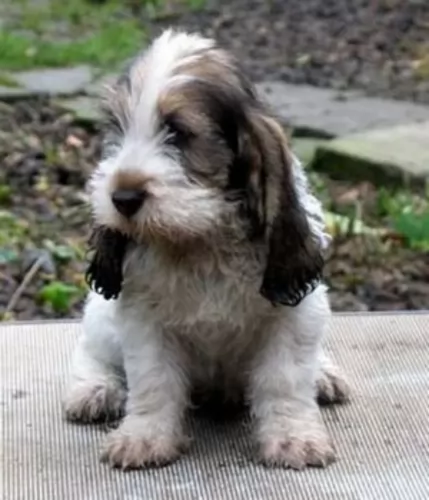 Both male and female dogs are much the same in size, standing at between 32 and 40cm and weighing between 15 to 20 kilograms.
Both male and female dogs are much the same in size, standing at between 32 and 40cm and weighing between 15 to 20 kilograms.
These are solid dogs with fairly short legs and a harsh double coat that is medium length and rough. The coloring is essentially white with patches of orange, lemon, tan or black. The dog has a general tousled appearance with quite a bit of hair around the face. The ears are set low and are floppy while the tail is medium length and held high.
The Petit Basset Griffon Vendeen is a friendly, social, outgoing dog that is good with children and other dogs. He is stubborn and should be trained and socialized so that he is well mannered around people and so that he also obeys simple commands.
They are quite noisy dogs, ‘talking’ to other dogs with a howl and bark.
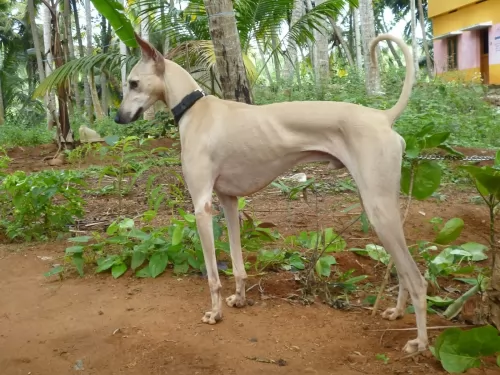 The Chippiparai is a loving, gentle family dog if well socialized, well trained and well exercised. They are very intelligent and need human companionship. Once they are living with a human family, they are very protective of that family. They are for the most part peaceful and quiet dogs. They are loyal and loving but they are not overly affectionate. Cuddlers they are not, and they do not like to play rough with children.
The Chippiparai is a loving, gentle family dog if well socialized, well trained and well exercised. They are very intelligent and need human companionship. Once they are living with a human family, they are very protective of that family. They are for the most part peaceful and quiet dogs. They are loyal and loving but they are not overly affectionate. Cuddlers they are not, and they do not like to play rough with children.
Accepting and loving within the family, the Chippiparai are equally hesitant and shy around strangers. They can be suspicious, but they are not aggressive. They are just very aloof with strangers, yet they hardly ever bark.
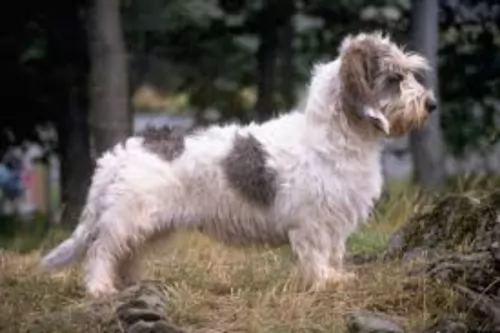 The Petit Basset Griffon Vendéen is known for his amicable characteristics. They’re also intelligent, curious dogs and will respond well to training and socialization.
The Petit Basset Griffon Vendéen is known for his amicable characteristics. They’re also intelligent, curious dogs and will respond well to training and socialization.
Apart from getting on well with children in the home, they also get on well with other dogs. They’re independent and strong willed and can be inclined to bark a bit to make himself known. It is why he is best suited to a home in the suburbs or countryside where his barking won’t disturb close-living neighbors, although training and socialization should change this habit. With training, this dog can become a most wonderful friend and pet.
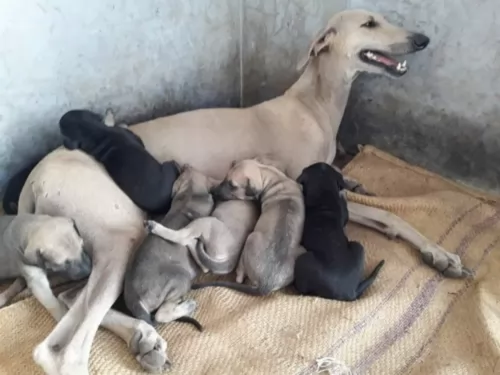 There are no clinical studies regarding the health and health history of the Chippiparai, so little is known about their long-term health. However, most who know the breed, believe it is an incredibly healthy one. They seem to have a lot less genetically transmitted health issues than other purebreds. Because of their isolation for centuries in India, they have developed immunities and resistance to most parasites and diseases other dog suffer from.
There are no clinical studies regarding the health and health history of the Chippiparai, so little is known about their long-term health. However, most who know the breed, believe it is an incredibly healthy one. They seem to have a lot less genetically transmitted health issues than other purebreds. Because of their isolation for centuries in India, they have developed immunities and resistance to most parasites and diseases other dog suffer from.
Because of this you should look for the types of issues that occur in dogs of this size and build. Have them tested by the Canine Eye Registration Foundation and the Orthopedic Foundation for Animals.
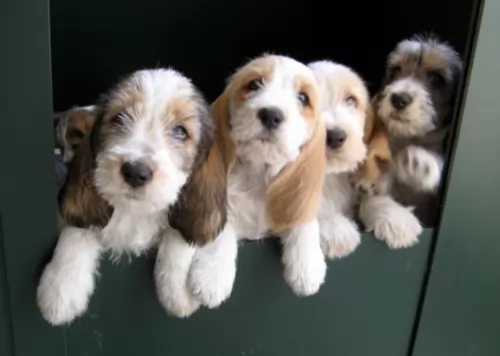 Average longevity of these dogs is about 12, 13, or 14 years if he gets looked after well.
Average longevity of these dogs is about 12, 13, or 14 years if he gets looked after well.
Eyes and joints are always a problem with the Petit and several of the eye diseases dogs get can actually lead to blindness.
Corneal wounds are fairly common in dogs. The cornea can be injured and lacerations can damage the eye. You’ll see your pet rubbing at the affected eye.
Hip joints can cause lameness and pain. Dogs can develop hip and joint problems at any age. Joint problems can be better eliminated by providing the dog with good nutrition and exercise. If your dog is obese, joint problems can be more severe. Weight loss can reduce the signs of joint pain in dogs.
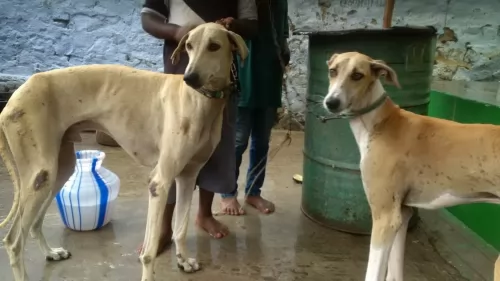 Do not overfeed your Chippiparai. Feed twice a day and no more than a total of 2.5 cups of high quality dry food.
Do not overfeed your Chippiparai. Feed twice a day and no more than a total of 2.5 cups of high quality dry food.
As mentioned previously the Chippiparai seems to have no genetic diseases or issues and very few acquired ones. However, he is sensitive to anesthesia and some foods. He is intolerant to cold weather and has a hard time with his pads on hard surfaces. Some Chippiparai might experience some of the ailments other breeds like them experience.
Both Elbow and hip are possible. This can cause arthritis and lameness. This occurs when the bone does not fit well into the joint.
This can cause lameness as well. The kneecaps slide over the knee instead of staying in place.
This is a hunting dog and he will want to hunt. They are incredibly fast and need the opportunity to run. Brisk walks will not be enough for this dog. He is very energetic. They will chase any small animals. It is not recommended that you have small pets even small dogs or cats with a Chippiparai. Having been bred for centuries to hunt, they are not likely to respond to any commands if they are off lease and chasing prey. Do not allow them to be off leash unless in a fenced area, and that fence needs to be 8 feet tall as they can easily jump a seven-foot fence. Try they at coursing, agility, fly ball and frisbee competitions.
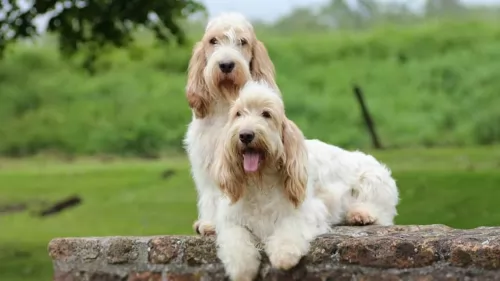 These are active dogs and they will like a daily walk to burn off some of their excess energy. They can adapt to living in the city or the countryside but they will certainly need to receive exercise wherever they are. Buy him some toys and a ball and throw it for him – this can be a wonderful form of exercise for your 4-legged friend.
These are active dogs and they will like a daily walk to burn off some of their excess energy. They can adapt to living in the city or the countryside but they will certainly need to receive exercise wherever they are. Buy him some toys and a ball and throw it for him – this can be a wonderful form of exercise for your 4-legged friend.
They need to be brushed at least twice a week to avoid matting and tangles. Some people opt to have the coat stripped. This is either done by hand or with a special stripping tool. Some dog owners prefer to hand the dog in for a professional cut, but this can alter the texture of the coat.
Because of the floppy ears, they will need regular ear cleanings to prevent ear infections brought about by dirt, wax and moisture within the ear.
He will also need to have his paw nails clipped. He can’t tell you about aching teeth, so do your canine friend a favor and check inside his mouth to ensure that all his teeth are still in tip top condition. Bad teeth can cause all kinds of illnesses and even affect the heart and kidneys.
The nutritional needs of your Petit Basset Griffon Vendeen are very important if your want your pet to enjoy good health.
Vitamins and minerals are an essential part of his nutrition, and luckily the top quality commercially manufactured dog foods see to it that the food has essential nutrients in them. With the best ones, your pet can expect a balanced diet.
Try and avoid the lower quality foods as these have toxic fillers and unhealthy ingredients in them that can make your pet sick.
Give him some home-made food too. You can chop this food up and mix it into his kibble occasionally to give him a healthy tasty treat. The best thing about dogs as pets is that they love their food to be simple and nutritious. Boiled chicken, brown rice or pasta and some healthy vegetables such as spinach, carrots and sweet potato will do him the world of good.
If you can, a little bit of raw meat from time to time can also be excellent for him. Make sure he is never without a bowl of fresh, cool water.